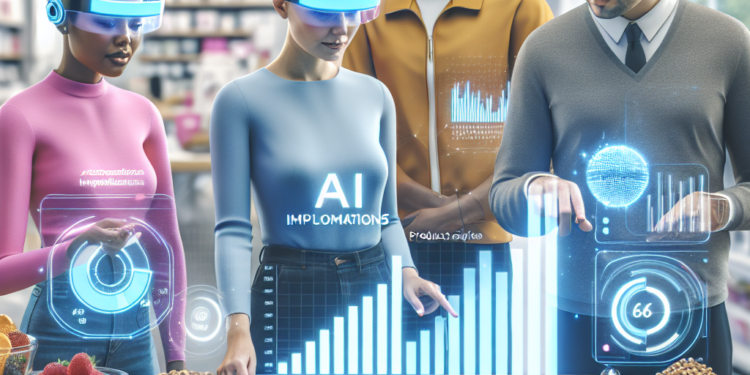Artificial intelligence (AI) has been transforming the retail industry in recent years, offering a wide range of solutions and opportunities for businesses to enhance their operations and better cater to customer needs. From personalized shopping experiences to supply chain optimization, AI is helping retailers stay ahead of the game in an increasingly competitive market. In this article, we will explore some of the key lessons that can be learned from AI implementations in the retail sector.
One of the most significant benefits of AI in retail is its ability to provide personalized shopping experiences for customers. By analyzing vast amounts of customer data, AI algorithms can make tailored product recommendations based on individual preferences and buying habits. This not only helps retailers increase sales but also enhances customer satisfaction and loyalty. Companies like Amazon have used AI to revolutionize the online shopping experience, with product recommendations accounting for a significant portion of their sales.
Another lesson that can be learned from AI implementations in retail is the importance of leveraging data to optimize supply chain management. By using AI-powered tools to analyze data from various sources, retailers can gain insights into consumer demand, inventory levels, and market trends. This enables them to make informed decisions about inventory management, pricing, and promotions, ultimately leading to improved efficiency and profitability. For example, Walmart has been using AI to optimize its supply chain, leading to significant cost savings and reduced waste.
AI can also play a crucial role in enhancing the customer service experience. Chatbots powered by AI technology can handle customer inquiries and provide real-time support, allowing retailers to offer 24/7 assistance to their customers. This not only improves customer satisfaction but also helps reduce response times and streamline the customer service process. Companies like Sephora have successfully implemented AI-powered chatbots to provide personalized beauty advice to their customers, boosting engagement and sales.
Furthermore, AI can help retailers better understand consumer behavior and preferences through advanced analytics. By analyzing data from various sources, including social media, online reviews, and purchase history, retailers can gain insights into what drives customer purchase decisions and tailor their marketing strategies accordingly. This allows them to create targeted marketing campaigns that resonate with their target audience and drive sales. For example, fast-fashion retailer Zara has been using AI algorithms to analyze customer data and predict fashion trends, enabling them to create popular collections that resonate with their customers.
One of the key lessons that can be learned from AI implementations in retail is the importance of integrating AI technologies with existing systems and processes. Retailers need to ensure that AI solutions are seamlessly integrated with their existing infrastructure, such as their e-commerce platform, CRM system, and POS system. This requires careful planning and coordination to ensure that AI algorithms can effectively leverage data from various sources and communicate with other systems in real-time. Companies like Target have successfully integrated AI-powered solutions with their existing systems, allowing them to streamline operations and improve efficiency.
Another important lesson is the need for retailers to prioritize data privacy and security when implementing AI solutions. With the increasing amount of data being collected and analyzed by AI algorithms, retailers must ensure that customer data is protected and comply with data privacy regulations. This includes implementing strong cybersecurity measures, encrypting sensitive data, and obtaining customer consent for data collection and processing. Failure to prioritize data privacy can result in significant reputational damage and financial penalties for retailers. Companies like Apple have been leading the way in implementing robust data privacy measures to protect customer information and build trust with their users.
In conclusion, AI implementations in the retail sector offer valuable lessons for businesses looking to enhance their operations and better serve their customers. From personalized shopping experiences to supply chain optimization, AI can help retailers stay competitive in a rapidly evolving market. By leveraging AI technologies to analyze data, optimize operations, and enhance customer experiences, retailers can drive sales, improve efficiency, and build long-lasting relationships with their customers. As the retail industry continues to embrace AI, it is essential for businesses to learn from successful implementations and best practices to stay ahead of the curve and thrive in the digital age.













